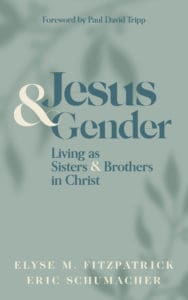
In this excerpt from Jesus and Gender: Living as Sisters and Brothers in Christ, Elyse M. Fitzpatrick and Eric Schumacher describe the importance of centering Jesus in our conversations about men, women, and gender roles.
How many times have you heard squabbling little children scream, “You’re not the boss of me!” as they marched off in anger. Sometimes when I’ve heard that from little ones, I’ve chuckled and thought, Oh, I get that. And although I probably wouldn’t ever put it in exactly that way, I’m sure I’ve said it thousands of times, at least in my own heart. For instance, when I see a blinking sign that tells me I’m exceeding the speed limit, my heart’s response is all too often, You’re not the boss of me.
Which brings us to the importance of defining what it means to be male and female through an incarnationally informed lens. How do you react to the You’re not the boss of me impulse in your own heart? The most common response to resistance against authority is to give more rules and consequences. Maybe if we made the rules and consequences clearer, more reasonable, or more firm or applicable, people would respond better. But is that what we learn in the New Testament?
Is that a gospel-shaped perspective? We don’t think so.
The Bible teaches that only One can quench the desire to define ourselves, and our lives, the way we think is best, and he is the humble King who used his own power to serve others (not himself) and then died. It is only as we learn that his way really is the only way to true freedom and peace that we will find our thirst for independence and authority quieted by his love.
We’re building a different perspective on men and women because so much of what has been written about the topic, especially in modern American evangelicalism, isn’t all that different from the norms of the ancient world when the power of the state, and the men who ran it, was the only acceptable norm. Patriarchy informed every relationship, from the lowliest foot-washing slave to the legion commander. Women and men, children and slaves were all expected to live within strict social roles, and no one dared challenge them without risking the ire of those in authority, which is why Jesus and his message of self-sacrifice shocked and repelled them so much. His humility was not only foolish but also repulsive to them. And it was frightening: It threatened the very structures they relied on for prosperity and civil society. Jesus shattered all their rules of who’s the boss when he stooped down and became the King who washed feet.
But it isn’t only Jesus who shattered those paradigms. Paul’s statements about sexual equality between husbands and wives in 1 Corinthians 7 would have been inconceivable to his readers, who viewed wives as little more than chattel or broodmares, while also affirming the right of husbands to consort with female or male household slaves (of any age), or prostitutes. Paul’s shocking assertion that husbands and wives were equal, especially in this most intimate area of relationship, and that husbands were to lay down their lives for their wives and love them as Christ loved the church was utterly anathema to the Corinthians and the Ephesians, as it would have been to any ancient society.
We find it troubling that even though many Christians accept the gospel accounts of Jesus’s life and the letters of Paul as truth, they frequently disregard them when framing discussions about relationships between women and men. Rather than living in amazement at Jesus’ humility and serving, some revert back to old patriarchal models of the ancient Near East, striving to somehow blend Christ’s message of humility and service with Rome’s message of power and rule. On the contrary, the New Testament is meant to stand, at least in part, as a rebuke against the structures of that day, structures that prized and guarded power over the weak, the use of authority for self-aggrandizement and ambition, and the denigration and disregard of those considered less valuable.
This book is important because we will reshape our paradigms about relationships between men and women, parents, children, church leaders, and parishioners from the perspective of the gospel. We aren’t saying that others who have written about gender and particularly gender roles before us don’t love and believe the gospel. We assume that they do and that they are our brothers and sisters in the faith. What we do question, however, is whether their perspectives on this topic have been as deeply informed by and tied to the gospel and the incarnation as they should have been.
We’re convinced that any perspective about either who we are as men and women or how we are to relate to men and women that is not based on Jesus’ life, death, and resurrection is not only futile, but it will also result in more and more conflict and resistance. That’s because rules without the assurance of love and forgiveness are powerless to make us love God and others. Indeed, love is the only power that is strong enough to transform us into humble, loving, and kind people. Without the assurance of God’s love, the law brings nothing but God’s wrath and subsequent spiritual death (2 Cor 3:7; Rom 4:15; see also Rom 3:20; 1 Cor 15:56; 2 Cor 3:6–7; Gal 2:16; 3:23–25; Jas 2:10). That’s because no one obeys it (Rom 3:10–23). As Paul proclaimed, rules are ineffective at transforming our hearts: “If a law had been granted with the ability to give life, then righteousness would certainly be on the basis of the law” (Gal 3:21).
Rules about how to be biblical men and women won’t make us love each other. They can’t. They won’t make us willing to embrace our God-given identities or help us be willing to walk in humble obedience. They can’t because they don’t have the power to. No, what we need is Someone who will transform our hearts by his love and humility.
This post is adapted from Jesus and Gender: Living as Sisters and Brothers in Christ by Elyse M. Fitzpatrick and Eric Schumacher (Kirkdale Press, 2022).







